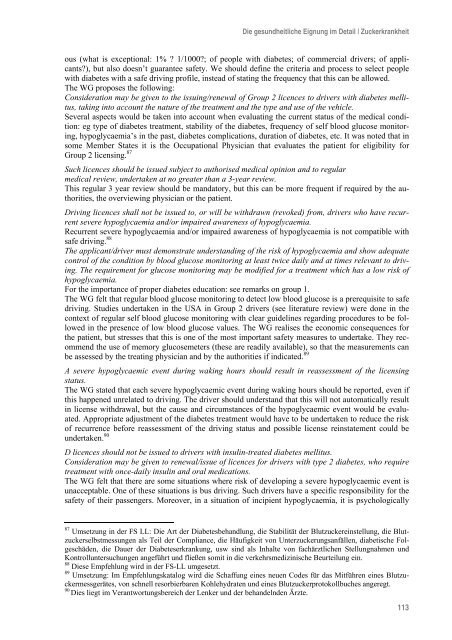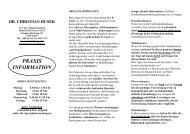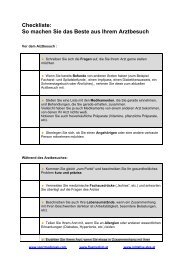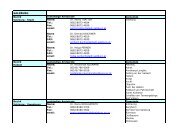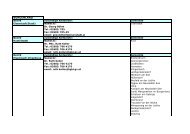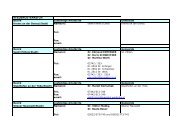Handbuch - Leitlinien gesundheitliche Eignung - Ärztekammer ...
Handbuch - Leitlinien gesundheitliche Eignung - Ärztekammer ...
Handbuch - Leitlinien gesundheitliche Eignung - Ärztekammer ...
Erfolgreiche ePaper selbst erstellen
Machen Sie aus Ihren PDF Publikationen ein blätterbares Flipbook mit unserer einzigartigen Google optimierten e-Paper Software.
Die <strong>gesundheitliche</strong> <strong>Eignung</strong> im Detail | Zuckerkrankheit<br />
ous (what is exceptional: 1% 1/1000; of people with diabetes; of commercial drivers; of applicants),<br />
but also doesn’t guarantee safety. We should define the criteria and process to select people<br />
with diabetes with a safe driving profile, instead of stating the frequency that this can be allowed.<br />
The WG proposes the following:<br />
Consideration may be given to the issuing/renewal of Group 2 licences to drivers with diabetes mellitus,<br />
taking into account the nature of the treatment and the type and use of the vehicle.<br />
Several aspects would be taken into account when evaluating the current status of the medical condition:<br />
eg type of diabetes treatment, stability of the diabetes, frequency of self blood glucose monitoring,<br />
hypoglycaemia’s in the past, diabetes complications, duration of diabetes, etc. It was noted that in<br />
some Member States it is the Occupational Physician that evaluates the patient for eligibility for<br />
Group 2 licensing. 87<br />
Such licences should be issued subject to authorised medical opinion and to regular<br />
medical review, undertaken at no greater than a 3-year review.<br />
This regular 3 year review should be mandatory, but this can be more frequent if required by the authorities,<br />
the overviewing physician or the patient.<br />
Driving licences shall not be issued to, or will be withdrawn (revoked) from, drivers who have recurrent<br />
severe hypoglycaemia and/or impaired awareness of hypoglycaemia.<br />
Recurrent severe hypoglycaemia and/or impaired awareness of hypoglycaemia is not compatible with<br />
safe driving. 88<br />
The applicant/driver must demonstrate understanding of the risk of hypoglycaemia and show adequate<br />
control of the condition by blood glucose monitoring at least twice daily and at times relevant to driving.<br />
The requirement for glucose monitoring may be modified for a treatment which has a low risk of<br />
hypoglycaemia.<br />
For the importance of proper diabetes education: see remarks on group 1.<br />
The WG felt that regular blood glucose monitoring to detect low blood glucose is a prerequisite to safe<br />
driving. Studies undertaken in the USA in Group 2 drivers (see literature review) were done in the<br />
context of regular self blood glucose monitoring with clear guidelines regarding procedures to be followed<br />
in the presence of low blood glucose values. The WG realises the economic consequences for<br />
the patient, but stresses that this is one of the most important safety measures to undertake. They recommend<br />
the use of memory glucosemeters (these are readily available), so that the measurements can<br />
be assessed by the treating physician and by the authorities if indicated. 89<br />
A severe hypoglycaemic event during waking hours should result in reassessment of the licensing<br />
status.<br />
The WG stated that each severe hypoglycaemic event during waking hours should be reported, even if<br />
this happened unrelated to driving. The driver should understand that this will not automatically result<br />
in license withdrawal, but the cause and circumstances of the hypoglycaemic event would be evaluated.<br />
Appropriate adjustment of the diabetes treatment would have to be undertaken to reduce the risk<br />
of recurrence before reassessment of the driving status and possible license reinstatement could be<br />
undertaken. 90<br />
D licences should not be issued to drivers with insulin-treated diabetes mellitus.<br />
Consideration may be given to renewal/issue of licences for drivers with type 2 diabetes, who require<br />
treatment with once-daily insulin and oral medications.<br />
The WG felt that there are some situations where risk of developing a severe hypoglycaemic event is<br />
unacceptable. One of these situations is bus driving. Such drivers have a specific responsibility for the<br />
safety of their passengers. Moreover, in a situation of incipient hypoglycaemia, it is psychologically<br />
87 Umsetzung in der FS LL: Die Art der Diabetesbehandlung, die Stabilität der Blutzuckereinstellung, die Blutzuckerselbstmessungen<br />
als Teil der Compliance, die Häufigkeit von Unterzuckerungsanfällen, diabetische Folgeschäden,<br />
die Dauer der Diabeteserkrankung, usw sind als Inhalte von fachärztlichen Stellungnahmen und<br />
Kontrolluntersuchungen angeführt und fließen somit in die verkehrsmedizinische Beurteilung ein.<br />
88 Diese Empfehlung wird in der FS-LL umgesetzt.<br />
89 Umsetzung: Im Empfehlungskatalog wird die Schaffung eines neuen Codes für das Mitführen eines Blutzuckermessgerätes,<br />
von schnell resorbierbaren Kohlehydraten und eines Blutzuckerprotokollbuches angeregt.<br />
90<br />
Dies liegt im Verantwortungsbereich der Lenker und der behandelnden Ärzte.<br />
113


